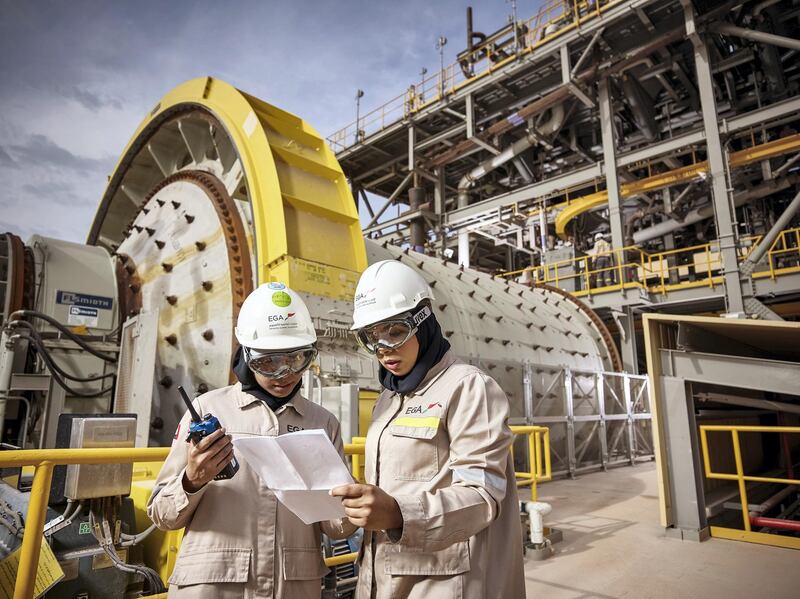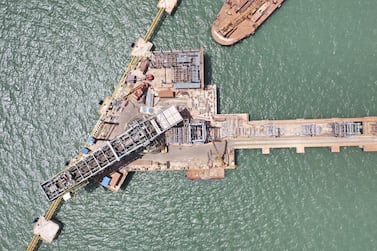Emirates Global Aluminium (EGA), the UAE's biggest industrial company outside the oil and gas sector, expects its new alumina refinery at Al Taweelah to attain full production next year, providing 40 per cent of alumina, the raw material it needs for aluminium production.
The $3.3 billion (Dh12.1bn) refinery will start producing two million tonnes of alumina per year in 2020, doubling its capacity from a total of one million tonnes it is set to produce by the end of 2019, EGA said. To date, the facility has produced 600,000 tonnes of alumina since operations started in April.
"We believe we're on the right trajectory to get to the ultimate objective of reaching our nameplate capacity: that's what it's designed for, two million tonne[s]," Zaher Al Habtari, senior vice president of refinery operations, told The National at the company's headquarters in Abu Dhabi. "Typically, in any industry, you always try to sweat the asset, try to maximise more production from it. That's what we always aim for, that will be our next focus."
EGA built the alumina refinery and invested $1.4bn in a bauxite mine in the West African nation of Guinea as part of a strategy to control all parts of the value chain. The aim is to reduce costs and secure raw materials for its aluminium production, given that alumina comprises 41 per cent of the smelter's costs. The first bauxite exports from the Guinea mine began in August and are sold to third-party customers, creating a new revenue stream for EGA.
Last month, the refinery's average daily production of alumina reached 88 per cent of its design capacity, EGA said.
The refinery converts bauxite ore, imported from Conakry-based Compagnie des Bauxites de Guinée, into alumina, a white powder used to make aluminium. Every tonne of alumina requires two tons of bauxite. In turn, making a ton of aluminium requires two tons of alumina.
EGA's refinery is the first facility of its kind in the UAE and second in the Middle East with a similar plant in Saudi Arabia.
Al Taweelah alumina refinery is located in Khalifa Industrial Zone in Abu Dhabi, spanning 1.4 square-kilometres or the equivalent of 200 football fields, with an operations team of 589 personnel. Of that workforce, 66 are UAE nationals including 37 women.
After refining, smelting and casting, the final product is sold to companies in various sectors including aerospace, cans and packaging, electronics, automotive and construction. EGA caters to markets in 50 countries across the globe, with the majority of sales to South East Asia followed by the US and Europe. The domestic market of the UAE accounts for about 10 per cent of EGA's sales.
Asked whether an expected slowdown in the global economy could impact demand for aluminium, Mr Al Habtari said that commodity markets are always cyclical and the focus is on ensuring a low-cash cost curve.
"Irrespective of the environment, because we can’t control market conditions or prices, as long as we keep our cash-cost as low as possible, it will allow us to weather all storms. We have that cushion to overcome some of these hurdles," he said.
EGA's operations are part of Abu Dhabi's push to diversify its economy away from oil, develop strategic industries and create jobs for the UAE nationals.
"Definitely as we move along in the next year and even next few years, we’re going to see the number of Emiratis [in the workforce] growing because our intention and objective is to ensure that we have competent, reliable [UAE] nationals at the core of what we do," Yousuf Bastaki, executive vice president of upstream operations, said.
EGA currently employs 1,000 Emiratis. It plans to hire more UAE nationals to fill 40 per cent of the jobs in the company that can be Emiritised by 2020.
According to the company's own economic impact report, EGA and the 26 UAE companies within the local aluminium cluster accounted for 1.4 per cent of the UAE's gross domestic product in 2017 and supported 60,000 jobs in the UAE.








